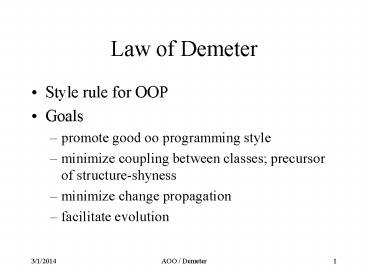Law of Demeter - PowerPoint PPT Presentation
Title:
Law of Demeter
Description:
promote good oo programming style ... Inside method M of class C one should only call methods attached to (preferred supplier classes) ... – PowerPoint PPT presentation
Number of Views:130
Avg rating:3.0/5.0
Title: Law of Demeter
1
Law of Demeter
- Style rule for OOP
- Goals
- promote good oo programming style
- minimize coupling between classes precursor of
structure-shyness - minimize change propagation
- facilitate evolution
2
Formulation (class form)
- Inside method M of class C one should only call
methods attached to (preferred supplier classes) - the classes of the immediate subparts (computed
or stored) of the current object - the classes of the argument objects of M
(including the class C itself) - the classes of objects created by M
3
Metric count number of violations of Law of
Demeter
- class version can be easily implemented
- large number of violations is indicator of high
maintenance costs - class version allows situations which are against
the spirit of the Law of Demeter
4
Preferred supplier objects of a method
- the immediate parts of this (computed or stored)
- the methods argument objects (which includes
this) - the objects that are created directly in the
method
5
Why object form is needed
A B D E. B D. D E. E .
class A void f() this.get_b().get_d().ge
t_e()
6
Formulation (object form)
- Inside a method M we must only call methods of
preferred supplier objects (for all executions of
M).
Expresses the spirit of the basic law and serves
as a conceptual guideline for you to approximate.
7
Object Form
A B D E. B D. D E. E .
a1A
b1B
d1D
e1E
d2D
e2E
class A void f() this.get_b().get_d().ge
t_e()
e3E
not a preferred supplier object
8
Object Form
A B D E. B D. D E. E .
a1A
b1B
d2D
e2E
class A void f() this.get_b().get_d().ge
t_e()
e3E
is a preferred supplier object (through aliasing)
9
Still can go against the spirit!
class A void f() g(this.get_b().get_d())
void g(D d) d.get_e()
satisfies object form of LoD but still violates
the spirit.
class A void f() this.get_b().get_d().ge
t_e()
10
Context switch































